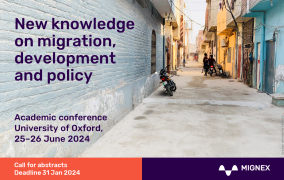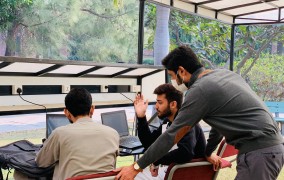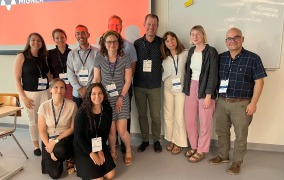MIGNEX Insight
What we've learnt about how governments can support diaspora contributions to sustainable development
Policy approaches to diaspora engagement by countries of origin and destination need to be holistic and tailored to different parts of the diaspora if they are to reap the largest developmental benefits.
Objective 19 of Global Compact on Migration (GCM) focuses on the need to create conditions for migrants and the diaspora to contribute to sustainable development in all countries. It recognises that the diaspora are contributing to holistic, positive development in countries of origin, through skills, social and financial capital. It also recognises the clear opportunity for governments of origin and destination to better support such contributions.
Accordingly, MIGNEX research - across 26 communities in ten countries in Africa, Asia and the Middle East in more than 13,000 interviews - found that diaspora networks have wide-ranging impacts on countries of origin. Yet these impacts often go under the radar; going beyond the more visible impacts (such as remittances) to include changes in ideas, perceptions, norms and culture which can contribute to social, culture and economic development in countries of origin.
At the MIGNEX Policy Conference: What’s next for EU migration and development policy in April 2024, we discussed how governments can harness the potential of diaspora in a policy roundtable. Here we share 5 key takeaways.
Let’s not get caught up on definitions
‘Diaspora’ is a term used in different ways – and it can be quite political. Traditionally, it refers to a group of people who have moved from an ancestral homeland, whereas in policy terms it often refers to the population of current emigrants. But for effective policymaking, rigid definitions are irrelevant. #
We concluded that governments should take a pragmatic approach to defining diaspora; relating to the specific members and groups targeted they aim to engage. This may mean targeting specific groups ie. older, younger, highly skilled, lower skilled, those in different destinations or from different parts of the origin country.
Where there is a will there is a way
Diaspora engagement often requires serious government investment and commitment, but when governments get serious about engaging their diaspora, they see a multitude of positive outcomes.
To reap the largest benefits and see clear results, approaches to diaspora engagement need to be holistic and tailored to different parts of the diaspora. This way governments are able to tap into a range of skills, competencies and needs. For example, some countries might relate more to first- and second-generation emigrants, whereas for others, the more historic diaspora could be an important group.
A good example of this tailored approach is Ghana. Over the past decade, the Ghanian government has targeted members of the diaspora living across the African continent as well as in North America and Europe. They have targeted first-generation migrants in those regions, as well as the second and third generations, and they have tailored the outreach process to the specific generation. In 2019, Ghana’s Year of Return commemorated 400 years since the first enslaved Africans arrived in North America. It ‘marked a ‘major landmark spiritual and birth-right journey’; encouraging ancestral tourism and re-connection with Ghana among the global diaspora.
This holistic approach has led to a big movement of people investing in the country, engaging in significant ways and even returning permanently. As Einstein Ntim, who leads the Innovation, Engagement and Communications arm at Ghana Diaspora Affairs, Office of the President explains:
Ghana's Diaspora Engagement Policy acknowledges the diverse nature of diaspora communities, including the Continental Diaspora - Ghanaian migrants and their descendants (2nd and 3rd generation, and the Historic Diaspora - Africans displaced by the Transatlantic Slave Trade over 400 years ago. Our strategy aims to harness the potential of these distinct diaspora communities for mutual socio-economic development leveraging their unique strengths to foster growth.
Integration and rights in host countries are critical to enabling the diaspora
Beyond countries of origin, countries of destination also need to ensure an enabling environment. Integration and access to rights in the country of destination facilitate the diaspora to contribute in a more meaningful way. Oleg Chirita from ICMPD notes that
“Empowering immigrants through secure legal status and robust integration policies unlocks their human potential to drive development. The better immigrants are integrated, the more they participate in the socio-economic, political and cultural lives of both their heritage country and host countries. Furthermore, enabling environments that recognise the intersectional nature of their identities amplifies their contributions and reduces inequalities.”
Critically, there is no trade-off between integration in the host country and development in the country of origin. Evidence shows that those who are most integrated in destination societies are those who contribute most to development in countries of origin. This has to do with a number of factors. For instance, people who are the most integrated – for instance those who have access to jobs, education, and understand the systems of the countries of destination - have the greatest capability to contribute to development.
So, integration and contributions to development in countries of origin are complements - not substitutes.
Initiatives should involve the private sector
Many current diaspora engagement initiatives are initiated by governments or civil society. However, there is a real opportunity to bring in the private sector. For example, in Lebanon, the diaspora in France has been instrumental in developing the tech sector through a partnership between Association Franco-Libanaise des Professionnels de l'Informatique (AFPI) and Berytech.
This requires an enabling environment to take advantage of all the benefits diaspora can bring. The conditions and challenges in the private sector, including low wages, can be off-putting for the diaspora to be involved. Creating a stronger enabling environment – such as improving the ease of doing business – not only fosters local development, but can also facilitate collaborations between the private sector and the diaspora.
Bring the diaspora into programming
The diaspora can also support development by advising and supporting development agencies in their programming. Germany, for example, has set up a Diaspora Advisory Board for the programme "Shaping development-oriented migration". This advisory board will be closely working with Germany’s development agency GIZ and the Federal Ministry for Economic Cooperation and Development (BMZ). As Alexandra Hilbig from GIZ explains, this has been set up in recognition that:
“The contribution that migrants and diaspora make to creating bridges between countries of origin and host countries need support. Creating possibility for participation and access to resources for engaged diaspora actors is an important way that host countries can mobilise to create a favourite environment for their engagement.”



